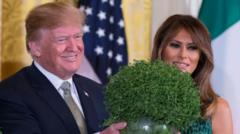Every year, as St. Patrick's Day approaches, a delegation of politicians, business leaders, and lobbyists from Ireland converge on Washington, D.C. for festivities that celebrate Irish culture. Amidst long-standing traditions—like wearing shamrock and attending political gatherings—these visits are touted as opportunities for fostering vital business and diplomatic relationships. However, the significance of these claimed benefits is coming under scrutiny, especially as several prominent Northern Ireland politicians opt out of this year's trip due to political differences with the Trump administration.
Advocates of the practice argue that these visits are pivotal for securing American investments back home. Previous participants assert that face-to-face engagement fosters connections that are often impossible to achieve through virtual platforms. Steve Aiken, noted for his past involvement with the British-Irish Chamber of Commerce and the Ulster Unionist Party, emphasizes the necessity of direct dialogue to influence relationships and promote collaboration.
In contrast, former Sinn Féin politician Máirtín Ó Muilleoir points out that being present in Washington during this traditionally festive time can be particularly advantageous, as American corporations often ramp up promotions linked to St. Patrick's Day. Statistics reveal a growing number of U.S. firms operating in Northern Ireland, signaling potential financial opportunities, although experts caution against directly linking political visits to concrete increases in investment.
While the ceremonial handing of shamrock from the taoiseach to the U.S. president may seem purely symbolic, it remains a recognizably historic tradition, dating back to 1952 for diplomatic purposes. Both Aiken and Ó Muilleoir reflect on the historical impact of these trips, notably during pivotal moments like the Good Friday Agreement in 1998.
Nevertheless, maintaining attention within U.S. politics proves challenging for Irish representatives, especially as the number of Irish-Americans holding positions of influence has dwindled over the years. The current political climate, compounded with the Israel-Gaza conflict, has prompted Sinn Féin and other parties to reconsider their participation, citing moral dilemmas while emphasizing the necessity of respectful and rewarding international ties.
As this year's St. Patrick's Day approaches, the decision of which political figures to send to Washington remains contentious. The ongoing debate reflects deeper issues about how Ireland maintains its presence on the global stage during a time of changing political landscapes and shifting narratives.
















